By Kim D. McHugh
Tips on buying authentic NATIVE AMERICAN WARES
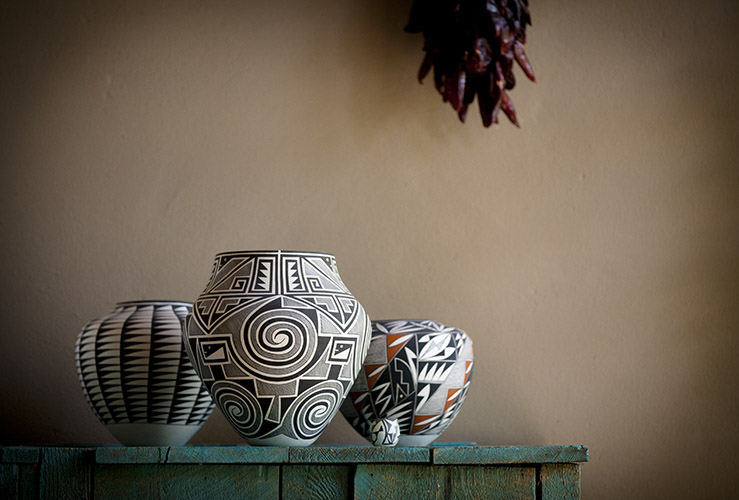
Having a Native American vibe as a central theme or simply to accessorize adds je ne sais quoi to your home’s decor, and Santa Fe is a hotbed for buying these authentic items. While there are numerous intricately designed replica items, from rugs and blankets to pottery and baskets to figurines and fetishes, if it’s authenticity you seek—and are willing to pay the associated premium prices—how do you know whether the Navajo rug you’re eyeing is the real deal? Buy from a reputable source, be it a long-standing trading post, an art dealer or directly from the Native American weaver. Don’t be fooled by labels affixed to the rugs, either.
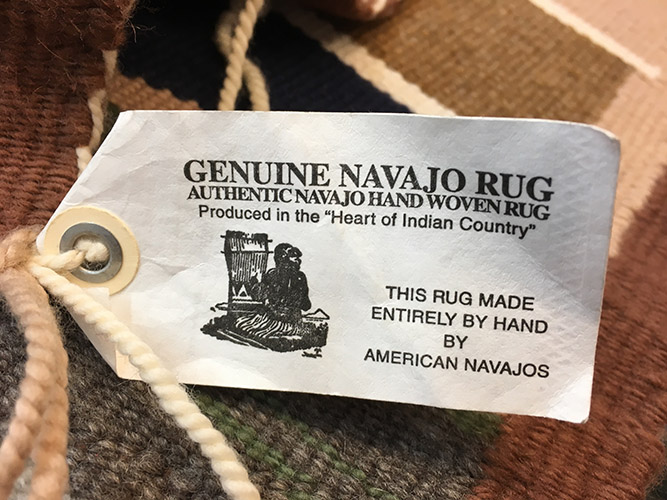
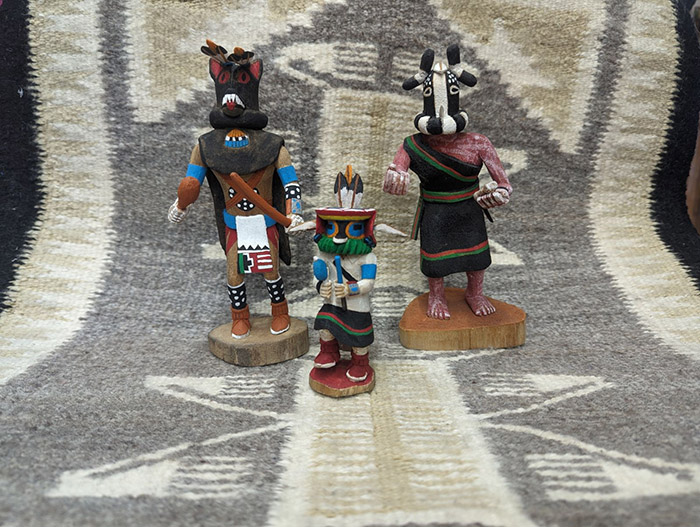
Photo courtesy of Tin-Nee-Ann
“Tags can be bought at many specialty stores in New Mexico,” says Jo Christen, proprietor of the family-owned Tin-Nee-Ann Trading Co. in Santa Fe. She adds that once, a friend came to her with ‘Navajo rugs,’ but they were actually from India. All these rugs had the same pattern—and in three different sizes.
Each genuine Navajo rug is unique, which is why the authentic ones often command top dollar. Do your homework, and you should be pleased with your purchasing decision.
“Navajo weavings are usually identifiable because of the manner that the rug is woven. Navajo artists use a vertical loom and single strings that move in one direction. When they get out to the end, they twist two threads all the way down and tie them off. You couldn’t do that on a horizontal loom. If you pull on the edge and there are a bunch of threads, it’s not a Navajo rug,” Christen says.
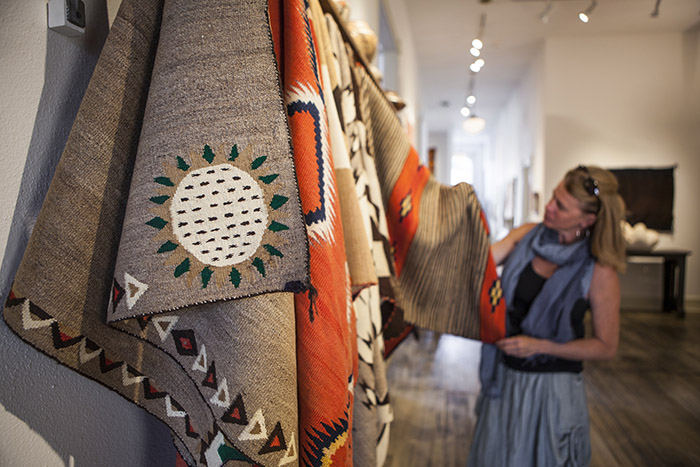
Photo courtesy of Tourism Santa Fe
How else do you verify it’s an authentic Navajo? The yarn making up the width is wool, while the horizontal yarn could be wool or cotton. Many rugs imported from Mexico, China and India use acrylic or other synthetic fibers, and you’ll see more symmetry and precision in the design because these rugs are machine-made. Since a genuine Navajo rug is hand-woven, the pattern is never uniform or exact, and a single selvedge cord woven down the side proves it is authentic. See tassels or fringes? Seldom do you see them in Navajo rugs.
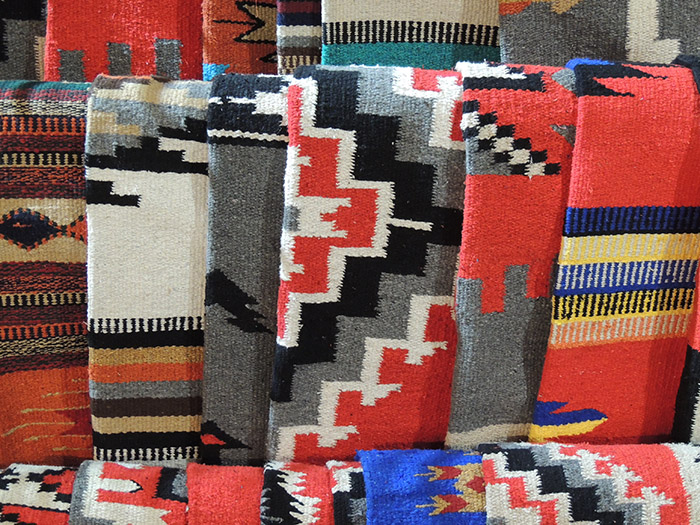
Photo By Kim D. McHugh
If you want to add kachina or Yeibichai dolls to your decor, know that traditional Hopi kachinas are carved from a single piece of cottonwood. If the legs and arms are pegged and glued, it isn’t Hopi carved. True Hopi kachinas have bodies that are proportionate to scale, and the painting of the figure is as meticulous as the knife work. Like authentic Navajo rugs, prices for vintage Hopi kachinas and Yeibichai dolls can range from $500 to well into the thousands.
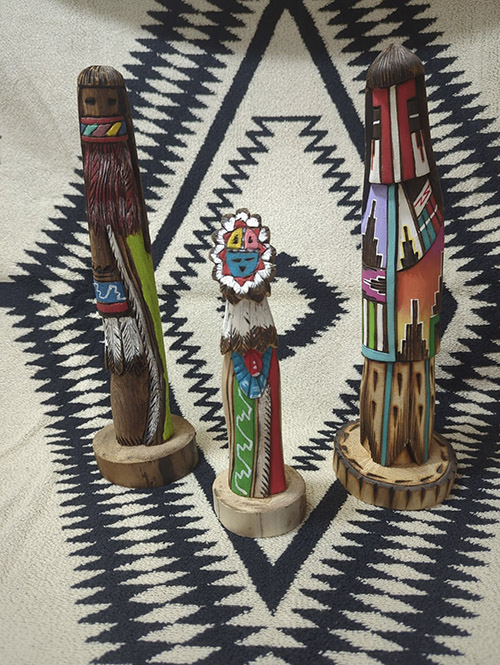
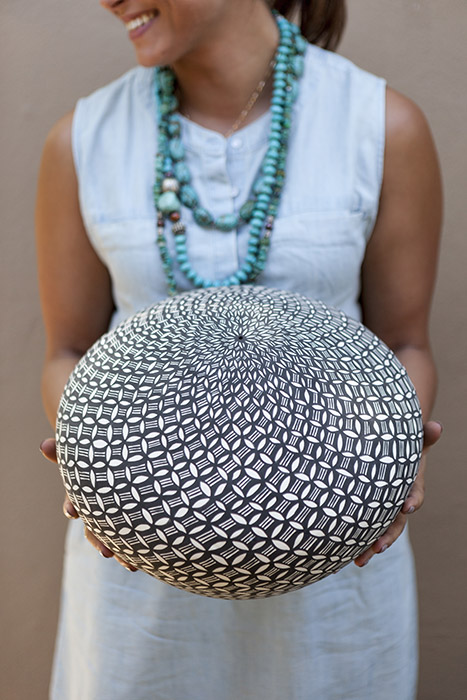
Left: Photo courtesy of Tin-Nee-Ann | Right: Photo courtesy of Tourism Santa Fe
If pottery is of interest, there are innumerable choices, but again, rely on the knowledge and integrity of your seller. Christen has a ‘go to’ book, “Pueblo Pottery Families, Acoma to Zuni,” that is an excellent resource for learning more about potters and their work. Whether drawn to figurines, rugs or pottery, whatever you choose will be conversation starters.
Do’s and Don’ts When You Shop:
Do interact with the Native American artists at the Palace of the Governors at the New Mexico History Museum. Not only do you meet them, but you’re also buying direct.
Do comparison shop. There are north of 20 places in Santa Fe to buy Native American–produced items. Compare, then make your choice.
Don’t forego buying rugs made in Mexico, India and China. They’re attractive, durable and inexpensive.
Don’t shy away from buying the less expensive kachina and Yeibichai dolls. Sure, they aren’t collector quality, but if they bring you joy, go for it!
Don’t ever negotiate prices with a Native American artist. It is poor manners, highly insulting and disrespectful.
Tin-Nee-Ann Trading Co.
on Cerrillos Road since 1972
505.988.1630
Nambe Trading Post
established 75 years ago
505.455.2819
The Original Trading Post
established in 1984
505.984.0759
Shiprock Santa Fe
established more than 30 years ago
505.982.8478
Wind River Trading Post,
established more than 40 years ago
505.989.7062
Santa Fe Indian Market


